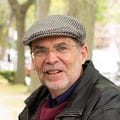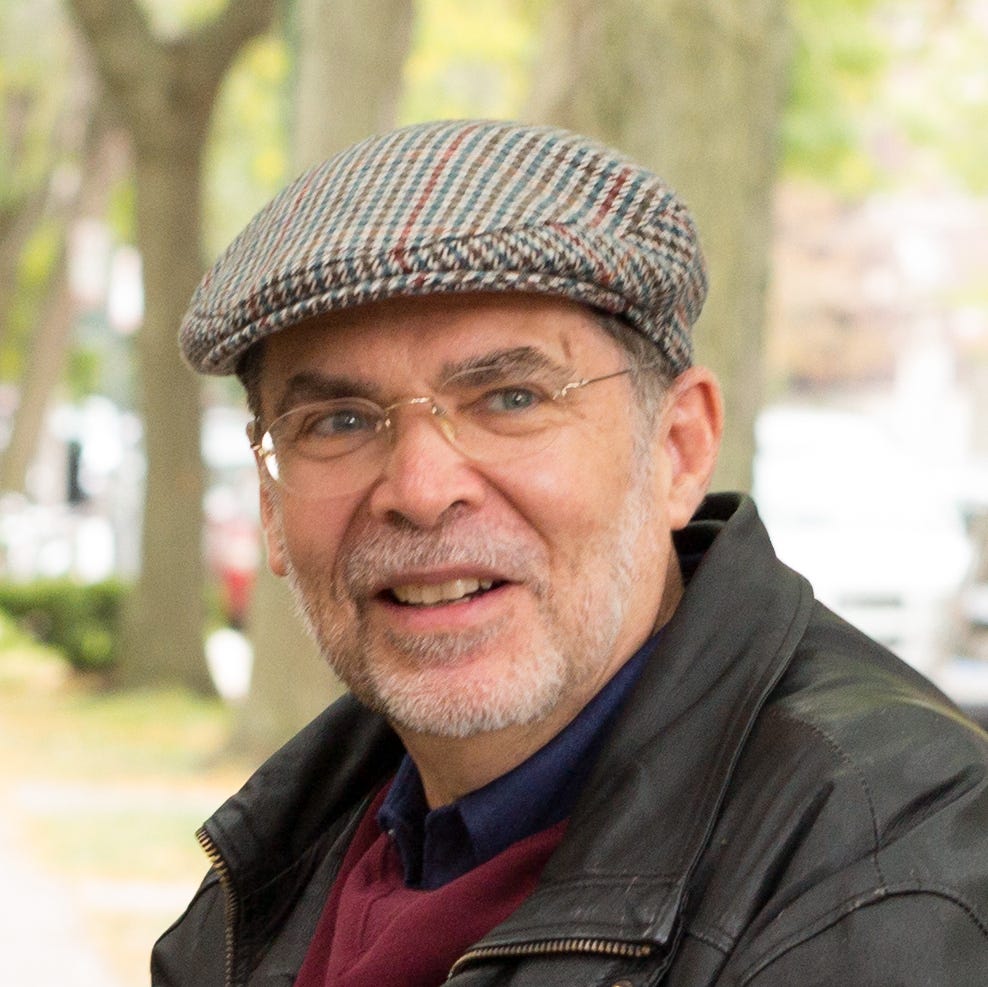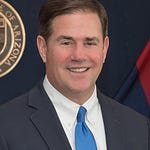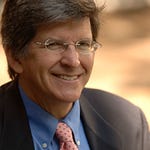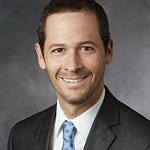David Mitch, an economic historian and professor of economics at the University of Maryland Baltimore County, joins the podcast to discuss the The Chicago School of Economics, including his 2016 Journal of Political Economy paper which uncovered how on the University of Chicago economics department nearly hired economists Paul Samuelson and John Hicks over Milton Friedman in 1946, along with David's work on economic growth including arguing how incentives for governments to promote growth historically may have been more to promote militarism than maximize the welfare of its citizens.
Jon: “Welcome to the Capitalism and Freedom in the 21st Century podcast, where we talk about economics, markets, and public policy. I'm Jon Hartley, your host. Today, I'm joined by David Mitch, an economic historian and professor of economics at the University of Maryland, Baltimore County. I'm so thrilled to have David on the podcast, because he's an amazing economic historian who's done fantastic work on economic growth, as well as the history of economic thought. And there's all sorts of details about Milton Friedman and the University of Chicago that I had never heard before. Welcome, David.”
David: “Thank you, John. Delighted to be here.”
Jon: “OK, David, just to jump in here, where did you grow up originally, and how did you get interested in economics? You were both an undergraduate and an economics PhD student at the University of Chicago. What is your early life story that got you interested in economics, and in particular, economics at the University of Chicago?”
David: “OK. Thank you for the question. So, I was born in Akron, Ohio. I actually spent the first six years of my life in New Zealand. My dad worked for BF Goodrich Attire Company, and so he was sent down there to work with an attire company down there. So, I came back when I was six years old and then continued on in a suburb of Akron, Ohio. So that's where I went to high school. I think what stimulated initially my interest in economics was my – he was an engineer, but he also got an MBA degree from Kent State University, doing stuff on the stock market, doing charting, Chartism with the stocks. But it was his copy of Samuelson's economics book that sort of first got me interested in economics. So, I had that interest.”
Jon: “The famous economics textbook that I think – at one point in its earlier stages – well, I think it's one of the original principles of economics book that sort of succeeded, I guess, Alfred Marshall's sort of original principles book. Samuelson's book was obviously succeeded by Greg Mankiw's principles book. But I remember famously in Samuelson's earlier books, he projects like economic growth for the USSR to overtake the GDP of the US. And of course, that never happened. And it's interesting thinking about all these projections and talking about economic growth and economic history. But for a while, I think in the 1980s, some thought that the GDP of Japan would eclipse that of the US. And for a long time, over the past couple of decades, people said the same about China. And we'll see what happens. So, you grew up in Ohio. And then you went to the University of Chicago. You spent over a decade there, both doing your undergrad and PhD studies. What was the department like then, and who were your advisors, and what got you into economic history?”
David: “So, I started there in 1969. And actually, at the time, they had a very famous set of economic historians. Robert Fogel, who later won the Nobel Prize, was there. Dierdre McCluskey was there at that time doing British economic history. And also, the person that really got me interested in economic history was a Russian economic historian named Arkady Skahan. And I actually remember my very first quarter, I think it was, and in the room, they used to put in advertisements for seminars. And by some fluke, there was something about the economic history seminar. And so, I went to that. One of my classmates who also went, who has since gone on to do quite well, his name is Gary Hoover, who I think had the dormitory named after him. So, we both showed up just as basically first-year undergraduates at this economic history seminar. And it was a very stimulating, lively thing. So that sort of first got my interest in economic history. That was sort of my first exposure to it. And I also remember in the general social science course that I took that we did hear Milton Friedman lecture as well as George Stigler. And actually, one of the episodes I remember from this, this was 1969-70, and there was a lot of protests going on about the Vietnam War and in general about the establishment. And Friedman was often the target of those protests. So, I remember a lecture that he gave and was disrupted by these protesters. And they started going on this big rant about socialism and injustice and all the problems with the capitalist system. And they went on and on in this rant. And the students in the audience started laughing. And the person going on is, how can you laugh at these things like poverty, injustice, racism, and so on? How can you do that? And Milton Friedman's response was, they're not laughing at any of those things. They're laughing at you.”
Jon: “That’s too funny. I remember when I was a University of Chicago undergrad, I remember Friedman had passed at that point. And also, he had long left University of Chicago back in the 70s after he won the Nobel. But I remember Bernie Sanders, Senator Bernie Sanders, coming to campus and protesting the Milton Friedman Institute or now what's known as the Becker Friedman Institute, which is really just a research institution and not even really much of a public policy think tank. But I remember just this massive campus-wide uproar over that. So, it's interesting that Milton Friedman was certainly, I guess, a controversial figure on campus from the beginning, from his early days. That's fantastic. And interesting, too, thinking about these seminars. I know Chicago started seminars and workshops who are sort of famous for having one professor that is usually sort of the king of these workshops. It would be Harry Johnson in the International Workshop, or Friedman in the Money Macro Workshop, and later, Lucas running that. It is very, I think, driven by one person. Whereas today, if you were to go to a lot of graduate student workshops, maybe there would be a few faculty members in it. And certainly, I think a few could, I think, match people like Friedman, who would notoriously get everyone to read through every page, and would cold call people, cold call students. And if a student said, I don't know, I have to think about it, he famously said, well, why don't we think about it now? And we'll try and get people to try and think on the spot. You recently published a very interesting paper in the Journal of Political Economy titled A Year of Transition, Faculty Recruiting at Chicago in 1946. And it's such a fascinating piece of the history of economic thought and the history of Chicago's economics department, in which you point out that Milton Friedman was actually almost not hired by the University of Chicago. I mean, it's crazy to think. I mean, what would the University of Chicago's economics department have looked like without Friedman? Would it even still have been thought of as its own school of thought and so forth? Can you explain a little bit more about how Milton Friedman was actually almost not hired to the University of Chicago's economics department? And actually, who the other runner-up was who would have actually kind of gotten in the totally stark opposite direction from what at least Milton Friedman's economic and political views were.”
David: “Well, to set the context, so you mentioned 1946. And actually, I start the article by pointing out how dismal things look for the department. This is in January, February of 1946. And Frank Knight wrote this letter to colleagues who were not there explaining what the misery was of the situation, which was.”
Jon: “Frank Knight of 19 Uncertainty and Old Chicago School. I mean, he was on the faculty since the 1930s or something.”
David: “Right, even a little bit earlier. But he pointed out that, first of all, the really big star at the time, Jacob Viner, had just resigned to go to Princeton. Also, the longstanding chair of the department, Simeon Leland, had just resigned to take a position at Northwestern. And so, then the issue was, what were they going to do? And they did have a number of faculty hiring spots. So, the issue was how to go about doing that. Who would they hire, and so on. And so, they had a long list of possible people. Deliberating on that, what has been noted by others before I sort of wrote about this is there was actually a quite diverse group within the department. So, there was some longstanding, what could be called more institutionalist types, like John Neff would be one example. There was also a group associated with the Kohl's Foundation that were much more technical, focusing on econometrics. Some of them actually had more, such as Jacob Marshak and Oskar Longa, had much more central planning orientations. And then there was a group- “
Jon: “And they were famously, I guess they left campus because of a big dispute with Norman Friedman when they went to Yale, right?”
David: “Eventually, eventually. But at that point, they were still very active. But then there was also the group with Frank Knight, which included Frank Knight himself, and then Henry Simons, Lloyd Mintz. Actually, those were the kind of more prominent people, but then there were others like- And one of the things my research uncovered is that they weren't totally aligned with H. Greg Lewis, the famous labor economist, who was also in that camp. And so, they each had their own sort of set of candidates, but they went through several rounds of deliberation. And in terms of the rankings, there was a third-of-the-way first choice that all the groups agreed on. Maybe Frank Knight a little bit less enthusiastically than the others, and this was John Hicks, who had risen to prominence at first the Lund School of Economics and then at Oxford, did subsequently win the Nobel Prize. So that was their sort of first target was John Hicks. He was- “
Jon: “He got the Hicksian demand and founding capital, which was sort of putting into, you know, he came into more formalism and he was, I think, very much a big part of sort of popularizing Hicks, which would have been a totally other, you know, stark direction to take the department in. There were others too.”
David: “But in fact, actually, as I recall, there were three slots they were trying to fill. So, they had three candidates that were sort of their first-round choices. So, the first was Hicks, who reasonably promptly turned down the offer, said he wasn't prepared to move. Then the second one was Albert Gale Hart, who at the time was based at Columbia and was a somewhat recent graduate of the University of Chicago. His area was more in monetary theory and macroeconomics. And then he finally decided he was going to stay at Columbia, did not really- wasn't prepared to make the move. And then the third choice, and this was really the one that the Frank Knight camp was pushing for as far as the way their first choice was George Stigler. And so, they did agree, but grudgingly, the Holes Foundation camp agreed to go along with this. And so, the department then wanted to make an offer for Stigler. But as the case then, I'm currently department chair, I'm familiar with the hiring procedures. Before the department could make an offer, they had to get approval by the central administration. And what happened is Stigler did have his required interview with somebody from the central administration. It was supposed to have been Robert Maynard Hutchins, who was sick that day.”
Jon: “The famous University of Chicago president who transformed the university and sort of got rid of D1 sports and famously leveled the football field and built a massive library on top of it, the Regenstein Library.”
David: “And so he was not available. And then so then his replacement, his last name was Colwell, as I recall. I have to look at the article to get his first name. He basically came from a theology background. But anyway, he was not very impressed by Stigler. Stigler in his memoir said he thought that Colwell thought he was too empirical. That wasn't the issue, that I found a memo that Colwell wrote to Hutchins just saying that he was reasonably intelligent, but he just was not sort of a top-level quality of somebody like Beiner.”
Jon: “I guess Stigler would end up going to win the Nobel, and I don't think Beiner ever did.”
David: “Well, He passed away.”
Jon: “He passed away earlier.”
David: “Probably in the very early days. I think he passed away about 1970, and that was just as the Nobel was getting started.”
Jon: Right, right. But I guess George Stigler was also sort of a bit of a controversial professor on campus. Well, I mean, he focused quite squarely on regulation and these sorts of policy issues, much more so than Friedman, and I guess he was a big part of that sort of free market camp. But I guess at some level, too, he was very interested in how incentives shaped immigration, too.”
David: “It was sort of ironic and sort of post-mortem of what happened. Stigler was known for his wit and humor and all this. But the way somebody described that interview is that, in fact, Stigler took more seriously what Colwell was asking. They thought that Colwell was asking some questions tongue-in-cheek, and Stigler didn't quite grasp that in terms of how things came across. But anyway, so that possibility got mixed. So that left sort of two remaining finalists, which were Milton Friedman, but the other one was Paul Sanderson.”
Jon: “Wow. Another stark opposite contrast from what you would associate to be the Chicago school, you know, sort of central free market orientation.”
David: “And so what happened is the Coles people were very strongly lobbying for Sanderson. The Knight people were strongly lobbying for Friedman, and then there were people that were sort of in the middle, like T. W. Schultz and some others that sort of had mixed views, one way or the other. And they were both brought for interviews. Actually, what happened is Friedman made a very positive impression on everybody, including the administration. So, they reasonably promptly made an offer to Friedman. Samuelson was brought in, and I think in general, the department, even though there was opposition, was prepared to make him an offer and wanted to do it, but as was Stigler, he made a very negative impression on some of the administrators. And there was this famous line that I think Helliwell sent to Hutchins about what Hutchins made of... And Samuelson, by the way, was a University of Chicago graduate, undergraduate.”
Jon: “He's an undergraduate. Right. And I think that's probably where a lot of his passion for economics was nurtured in an early age. I think he was maybe even... I think he grew up in Hyde Park, too. I think he was in high school.”
David: “I think he was in Hyde Park, too.”
Jon: “Yeah. You're right. But yeah, close enough that I think he, as a high school student or something like that, was going to seminars at the University of Chicago or something like that. And also, an eventual Nobel Prize winner, too, but certainly somebody that you'd heavily associated with Harvard and MIT and Cambridge that, historically, I suppose, more of a... Or at least not quite a free-market orientation that Chicago was famous for, to say the least.”
David: “But anyway, Hutchins did make the interview with Samuelson, and then later he had to go out of town, so that preserves the record of what Hutchins made of Samuelson. And Helliwell asked Hutchins to say what he commented. Hutchins, in a telegram back, said, well, in my opinion, Samuelson hasn't changed. He's a vicious character with a high IQ.”
Jon: “I mean, this is just amazing.”
David: “And so, actually, if I could finish, even though there was this negative reaction, the department still did succeed in making an offer to Samuelson, but then Samuelson decided not to accept it. Basically, at that point, stayed at MIT.”
Jon: “And do you know why he didn't accept it? I'm not clear.”
David: “I think there's been a separate track writing about that. Some have written about that. And there's a volume on MIT economics about some of the considerations. But I think part of it is... And they did try later on to also make him an offer a few years, in 47 and 48. And my sense is that he thought he had really a good arrangement at MIT in terms of being able to control and build up the department. And I think he would have had some awareness. There would have been some resistance to what he would be trying to do at Chicago.”
Jon: “I mean, it's fascinating, too, to think just part of how MIT and Chicago, both as faculties and universities, rose and gained dominance in the academic sphere was in part because, unlike Harvard and many other older schools, that they weren't applied by anti-Semitism to the extent not getting hired by Harvard when you first went on the market after graduate school. I'm curious, from somebody that's interested in economic history, as an economic historian, and particularly one that's written a paper and done a big project like this on understanding economics department hiring and voting and what was going on behind the scenes, do economics departments keep records of these things? I've never been on a hiring committee and I've only been an economics graduate student undergrad, but are all these sorts of decisions being logged and being archived and so forth?”
David: “Well, they do keep records and that's what I base this on. Spending extensive time in Chicago archives and the Department of Economics has its own set of files there. It's kind of hit or miss what they actually seize and what they're required to keep. And it was sort of a fluke in 1946 that this particular vote, there actually was a record kept of the voting sort of by faculty member. And what sort of makes it interesting, the way they actually, you can do votes in different ways about how you rank or how you set up the choice among candidates, but the way that this particular set of decisions is made is through what could be called a board account, where basically each of the faculty member voting, they don't just vote yes or no or whatever, but depending on the number of candidates, then they give points according to what the preferences of the candidates. So, you can either give the number one candidate a number one or if there are five candidates, you can give it a number five. There's actually a measure of the intensity, so it's not just the number of votes, it's actually the intensity of voting that counts in terms of the overall sum.”
Jon: “I guess the board account is one famous way to sort of overcome errors and possibilities. I think when you do that, you relax one of the constraints. [Inaudible 20:45] I'm still just amazed that you could go to an economics department and they would give you these records. I'm sure if I went to the chamber of economics department and asked for the tenure vote on recent faculty, on who voted for who, there's no way I would be getting that. I'm not even sure. Is there any ability to track these, or is it voice vote, or at your point, maybe some departments do voting by ballots versus others by hand or voice vote?”
David: “Well, a lot of this depends actually on the archivist and the way they set up the records, and also the conditions in which the papers are donated, the records are donated. Commonly, there are restrictions on when the files could be opened up. That was the case actually with P. W. Schultz's papers, who was chair for many years, and there were certain papers that had restrictions on whether one could look at them or not. The Department of Economics records, going up to about 1960, there weren't those sorts of restrictions. And there are other people's papers I've looked at, I won't mention particular names, where there wasn't the same sort of care taken by, I guess, the donor and then the archivist. And so, there's a lot of stuff in letters of recommendation and so on, letters of opinion and so on, that are really pretty sensitive, that one can look at and even make copies of. So, it's sort of hit or miss what one comes across in that regard.”
Jon: “That's amazing. And, I mean, to your credit, I'm sure going through many, many archives and having to go to many different sources is not an easy thing to do, to say the least. So, my hat is off to you in uncovering this.”
David: “In fact, if I could just mention one other thing, part of the issue, one has to like reading archives, and that's kind of, you know, sort of how I got into this line. And, in fact, the person that really sort of got me interested in economic history was a faculty member there named Archivist Cahan. And he had this study carrel down in Regenstein that was just sort of filled with all kinds of papers and documents. And when I saw that, that kind of, that looked like something I sort of wanted to do. So, I enjoy spending time in archives. But the thing is, often we find stuff in unexpected places. In the course of working on this, I looked, for example, at the office of the president's papers. And that's where a lot of this stuff, because there tends to be a paper trail up the chain of command for the administration, and that can often reveal stuff. And we'll see if you want to just look at the economics department as such.”
Jon: “That's fascinating. And this particular advisor of yours actually passed away just around the time that you were graduating.”
David: “Right, right.”
Jon: “It's unfortunate that life was cut short. And amazing, too, thinking about all these great economic historians like yourself that have gone through the University of Chicago. I know other departments like Stanford, for example, takes economic history, along with Northwestern takes economic history very, very seriously. It's always great to hear from an Asian historian. So, I also want to pivot here to economic growth and some of the work that you've done. You've spent a lot of time, aside from the history of economic growth, I think you've spent even more time on economic growth. In particular, you have a theory about economic growth and the incentives for governments to promote economic growth and how they might be less well understood than people perhaps realize. Could you elaborate and explain a little bit more about your theory on growth and the government's incentive to promote it?”
David: “It is just a theory, so I'm not claiming this universally explains everything. But in a way, the starting point, one of the things I've been doing over the last several, few decades actually, my teaching is I, even though I don't do research in it, I teach a course in Asian economic history. And one of the phrases I came across, this was first for 19th century Japan, but actually goes back to ancient China, and one version of it is prosperous people, strong army. So, the prosperous people, the prosperity part is sort of the economic growth component, and then the strong army is the other part. As with a lot of sorts of Chinese, Japanese phrases, there's no verb there. So, you have these two noun clauses, rich people, strong army, and then there's sort of a connection between the two. But in Japan, when I first encountered this, this is in the 19th century, the connection was Japan wanted to bring up its prosperity so it could develop a stronger military. This is after it had been invaded by the Admiral Perry's gunboats and so on, and so they realized their technological inferiority and wanted to catch up. And they realized to do that, they would have to promote economic growth. But then I started tracing this back, and it goes back really to ancient China, 3-400 B.C., where this phrase originally goes. And it’s sort of ambiguous what the direction of causation is. But as you get into it, one can see that this is a common motive in a variety of places and time periods. This perception by rulers that by developing economic growth, that's the best way to provide resources for developing the military, even more so than just sort of taxation systems and so on. And one can find this theme, for example, in early modern Europe, and this is something actually Jacob Beiner wrote a very good article, and the two nouns he puts together are power and plenty. And actually, you find this phrase in Adam Smith, and there's been an interesting issue about how you interpret this. Smith, by the way, even though people think of him as a free trader and opposed to government interventions, there are passages where he advocates and can see the reasons for things like the Navigation Acts. And there's a passage in the same chapter where he talks about the judicial hand promoting economic growth, and he says, well, maybe there should be Navigation Acts because it can help promote the defense, help promote the Navy, provide resources for the Navy. And then he says, because defense is more important than opulence, maybe the Navigation Acts aren't a bad thing. I've seen interpretations that he may be sarcastic. But again, he does acknowledge the importance of basically strong defense for ultimately the prosperity of the country and is laying the foundation for that.”
Jon: “Well, I mean, it's interesting because Adam Smith, he wrote a lot in many respects sort of against mercantilism, which was very much about promoting militaristic objectives through sort of economic means. And their approach is very different, like involving like hoarding gold and things of this nature and avoiding trade and so forth on particular nations. But I guess like maybe Smith's point was that actually if your true goal is to promote militaristic objectives, then following sort of a somewhat green market economy to some degree can actually help promote those objectives a bit better. It's a super interesting theory. And it's also interesting to think about just all other sort of theories of growth that have been talked a lot about in recent years. And I think in particular about narratives around the government's role in promoting technology and technological growth. I think in sort of the more popular economics press, you think about Mariana Mazzucato's work, like the entrepreneurial state, the value of everything. We see these arguments that things like, for example, the Internet and GPS came about through DARPA. It's a very stark contrast from, I think, the opening of Milton Friedman's Capitalism and Freedom in 1962, where he sort of dismisses all the things that government has done and says, well, who came up with the assembly line? Henry Ford. And there's a lot of other free market examples about how sort of private industry has really been responsible for so much technological development. Now, what you're saying is more about government incentives, not about how growth comes about per se. But it's interesting to think about not only you know, why governments may want growth, but to what degree they can promote technological development on top of sort of growth through the means of, you know, spending taxes, you know, lower taxes and so forth, in the, I guess, sort of the more Keynesian route. But this is all, you know, fascinating on all fronts. And, you know, every time I talk with you, I learn so many historical facts that I had no idea about. And really fascinating to learn how Milton Friedman was almost not hired by the University of Chicago's Economics Department. Instead, you know, maybe John Hicks or Paul Tangentson, you know, could have joined the department instead and could, you know, imagined how different of a character the Department of Economics at the University of Chicago had taken on. And perhaps, you know, the Chicago School, as people perceive it and have thought about it really since, I think, the 1980s and before that, you know, would have been, you know, totally different had Milton Friedman not ended up being that compromised candidate that everyone wanted. And fascinating to talk about economic growth as well. I think always, and for quite a while, it's been sort of the number one issue in economics. You know, trying to explain economic growth and understand it. Well, thanks so much, David, for coming on. It's been a real pleasure.”
David: “Thank you for the invitation. I've enjoyed it very much.”
Jon: “Our guest today was David Mitch, an economic historian and professor at the University of Maryland, Baltimore County. You've been listening to the Capitalism and Friedman in the 21st Century podcast where we talk about economics, markets, and public policy. I'm John Hartley, your host. Thanks so much for joining us.”

